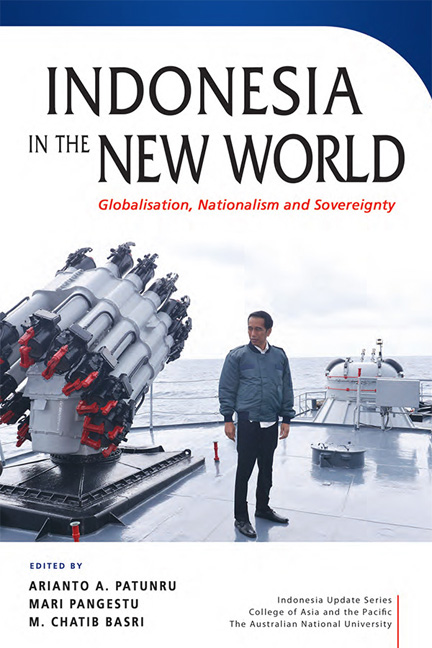Book contents
- Frontmatter
- Contents
- Tables
- Figures
- Contributor
- Acknowledgments
- Glossary
- 1 Challenges for Indonesia in the new world
- PART 1 Globalisation, Nationalism and Sovereignty: the Indonesian Experience
- PART 2 Nationalism in Practice
- PART 3 Impact of and Response to Globalisation
- PART 4 The Human Face of Globalisation
- PART 5 Navigating The New Globalisation
- 14 Indonesia and the global economy: missed opportunities?
- 15 International cooperation and the management of globalisation: the Indonesian experience
- Index
- INDONESIA UPDATE SERIES
15 - International cooperation and the management of globalisation: the Indonesian experience
from PART 5 - Navigating The New Globalisation
Published online by Cambridge University Press: 08 June 2019
- Frontmatter
- Contents
- Tables
- Figures
- Contributor
- Acknowledgments
- Glossary
- 1 Challenges for Indonesia in the new world
- PART 1 Globalisation, Nationalism and Sovereignty: the Indonesian Experience
- PART 2 Nationalism in Practice
- PART 3 Impact of and Response to Globalisation
- PART 4 The Human Face of Globalisation
- PART 5 Navigating The New Globalisation
- 14 Indonesia and the global economy: missed opportunities?
- 15 International cooperation and the management of globalisation: the Indonesian experience
- Index
- INDONESIA UPDATE SERIES
Summary
In this chapter we discuss how international trade cooperation has influenced the process of globalisation in Indonesia. International trade cooperation here refers to the set of rules and institutions, binding and non-binding commitments, and principles and best practices that define the conduct of international trade, including the movement of goods, ser¬vices, investment and people. We evaluate the role of international trade cooperation in shaping both the reform process in Indonesia and, more generally, Indonesia's response to globalisation. We are interested in how the country has managed to balance the domestic political pressure for protection, on the one hand, against its role in international forums, on the other.
The chapter consists of five sections. In the first section we discuss the experience of Indonesia with globalisation. We then examine the role of international trade arrangements such as the General Agreement on Trade and Tariffs (GATT), the World Trade Organization (WTO), the Asso¬ciation of Southeast Asian Nations (ASEAN) and Asia-Pacific Economic Cooperation (APEC) in shaping that experience. Next, we highlight two cases in which trade facilitation has contributed to Indonesia's global eco¬nomic integration: logistics and tourism. This is followed by a discussion of the recent trend towards protectionism in Indonesia and its implica-tions for regional trade negotiations. We end with some conclusions and recommendations.
THE CASE FOR GLOBALISATION: INDONESIA's EXPERIENCE
Globalisation has benefited a large number of countries. As one of the East Asian ‘miracle’ countries, Indonesia achieved high and sustained eco¬nomic growth, reductions in poverty and improvements in equity during the period 1965–90 by maintaining an open trade and investment policy (World Bank 1993). Many developing countries were able to grow faster than the advanced economies, leading to a narrowing of the gap between the two groups of nations. Baldwin (2016), for instance, shows that the share of developed (G7) economies in world GDP has declined sharply since 1990, while that of six fast-growing industrialising countries (China, Korea, India, Indonesia, Poland and Thailand) has risen.
- Type
- Chapter
- Information
- Indonesia in the New WorldGlobalisation, Nationalism and Sovereignty, pp. 294 - 316Publisher: ISEAS–Yusof Ishak InstitutePrint publication year: 2018



